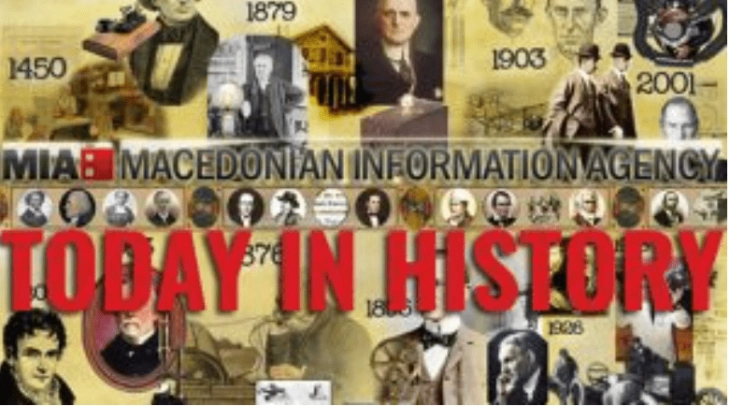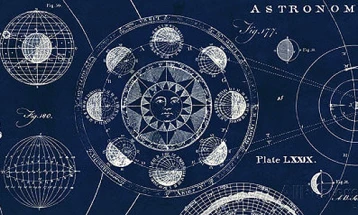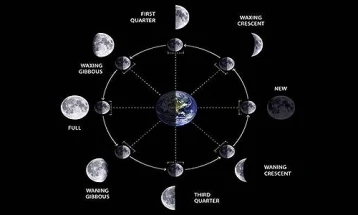Today in history
- 21 November 2024 (MIA)

21 November 2024 (MIA)
1620 – Plymouth Colony settlers sign the Mayflower Compact (November 11, O.S.)
1783 – In Paris, Jean-François Pilâtre de Rozier and François Laurent d’Arlandes, make the first untethered hot air balloon flight.
1789 – North Carolina ratifies the United States Constitution and is admitted as the 12th U.S. state.
1877 – Thomas Edison announces his invention of the phonograph, a machine that can record and play sound.
1894 – Port Arthur, China, falls to the Japanese, a decisive victory of the First Sino-Japanese War, after which Japanese troops are accused of the massacre of the remaining inhabitants of the city.
1900 – “Bloody Macedonian Wedding” by Macedonian playwright Vojdan Chernodrinski, credited with founding Macedonian theater arts, premieres in Sofia.
1905 – Albert Einstein’s paper, “Does the Inertia of a Body Depend Upon Its Energy Content?”, is published in the journal Annalen der Physik. This paper reveals the relationship between energy and mass. This leads to the mass–energy equivalence formula, E = mc².
1910 – Sailors on board Brazil’s most powerful military units, including the brand-new warships Minas Geraes, São Paulo, and Bahia, violently rebel in what is now known as the Revolta da Chibata (Revolt of the Lash).
1916 – Mines from SM U-73 sink the HMHS Britannic, the largest ship lost in the First World War.
1918 – The Flag of Estonia, previously used by pro-independence activists, is formally adopted as the national flag of the Republic of Estonia.
1918 – A pogrom takes place in Lwów (now Lviv); over three days, at least 50 Jews and 270 Ukrainian Christians are killed by Poles.
1920 – Irish War of Independence: In Dublin, 31 people are killed in what became known as “Bloody Sunday”. This included eleven British intelligence agents and informants, fifteen Irish civilians, and two Irish Republican Army prisoners.
1927 – Columbine Mine massacre: Striking coal miners are allegedly attacked with machine guns by a detachment of state police dressed in civilian clothes.
1945 – The United Auto Workers strike 92 General Motors plants in 50 cities to back up worker demands for a 30-percent raise.
1950 – Two Canadian National Railway trains collide in northeastern British Columbia in the Canoe River train crash; the death toll is 21, with 17 of them Canadian troops bound for Korea.
1953 – The Natural History Museum, London announces that the “Piltdown Man” skull, initially believed to be one of the most important fossilized hominid skulls ever found, is a hoax.
1962 – The Chinese People’s Liberation Army declares a unilateral ceasefire in the Sino-Indian War.
1964 – Second Vatican Council: The third session of the Roman Catholic Church’s ecumenical council closes.
1967 – Vietnam War: American General William Westmoreland tells news reporters: “I am absolutely certain that whereas in 1965 the enemy was winning, today he is certainly losing.”
1969 – U.S. President Richard Nixon and Japanese Premier Eisaku Satō agree in Washington, D.C., on the return of Okinawa to Japanese control in 1972. Under the terms of the agreement, the U.S. is to retain its rights to bases on the island, but these are to be nuclear-free.
1970 – Vietnam War: Operation Ivory Coast: A joint United States Air Force and Army team raids the Sơn Tây prisoner-of-war camp in an attempt to free American prisoners of war thought to be held there.
1971 – Indian troops, partly aided by Mukti Bahini (Bengali guerrillas), defeat the Pakistan army in the Battle of Garibpur.
1972 – Voters in South Korea overwhelmingly approve a new constitution, giving legitimacy to Park Chung-hee and the Fourth Republic.
1974 – The Birmingham pub bombings kill 21 people. The Birmingham Six are sentenced to life in prison for the crime but subsequently acquitted.
1977 – Minister of Internal Affairs Allan Highet announces that the national anthems of New Zealand shall be the traditional anthem “God Save the Queen” and “God Defend New Zealand”, by Thomas Bracken (lyrics) and John Joseph Woods (music), both being of equal status as appropriate to the occasion.
1979 – The United States Embassy in Islamabad, Pakistan, is attacked by a mob and set on fire, killing four.
1985 – United States Navy intelligence analyst Jonathan Pollard is arrested for spying after being caught giving Israel classified information on Arab nations. He is subsequently sentenced to life in prison.
1986 – Iran–Contra affair: National Security Council member Oliver North and his secretary start to shred documents allegedly implicating them in the sale of weapons to Iran and channeling the proceeds to help fund the Contra rebels in Nicaragua.
1995 – 19.500 tons of American corn bound for Macedonia is blocked at the Thessaloniki Port.
1995 – The Dayton Agreement is initialed at the Wright-Patterson Air Force Base, near Dayton, Ohio, ending three and a half years of war in Bosnia and Herzegovina. The agreement is formally ratified in Paris, on December 14 that same year.
1996 – Humberto Vidal explosion: Thirty-three people die when a Humberto Vidal shoe shop explodes.
1998 – The Legend of Zelda: Ocarina of Time, one of the most successful and influential video games of all time, was released in Japan.
2002 – NATO invites Bulgaria, Estonia, Latvia, Lithuania, Romania, Slovakia and Slovenia to become members.
2004 – The second round of the Ukrainian presidential election is held, giving rise to massive protests and controversy over the election’s integrity.
2004 – The island of Dominica is hit by the most destructive earthquake in its history. The northern half of the island sustains the most damage, especially the town of Portsmouth. It is also felt in neighboring Guadeloupe, where one person is killed.
2004 – The Paris Club agrees to write off 80% (up to $100 billion) of Iraq’s external debt.
2006 – Anti-Syrian Lebanese politician and government minister Pierre Gemayel is assassinated in suburban Beirut.
2009 – A mine explosion in Heilongjiang province, northeastern China, kills 108.
2012 – At least 28 are wounded after a bomb is thrown onto a bus in Tel Aviv.
2013 – A supermarket roof collapses in Riga, Latvia, killing 54 people.
2013 – Massive protests start in Ukraine after President Viktor Yanukovych suspended singing the Ukraine–European Union Association Agreement.
2014 – A stampede in the city of Kwekwe in Zimbabwe caused by the police firing tear gas kills at least eleven people and injures 40 others.
2015 – The government of Belgium imposes a security lockdown on Brussels, including the closure of shops, schools, public transportation, due to terrorist attack threats.
2016 – India celebrates 50th anniversary of IR8, rice variety specially bred that saved much of Asia from famine.







